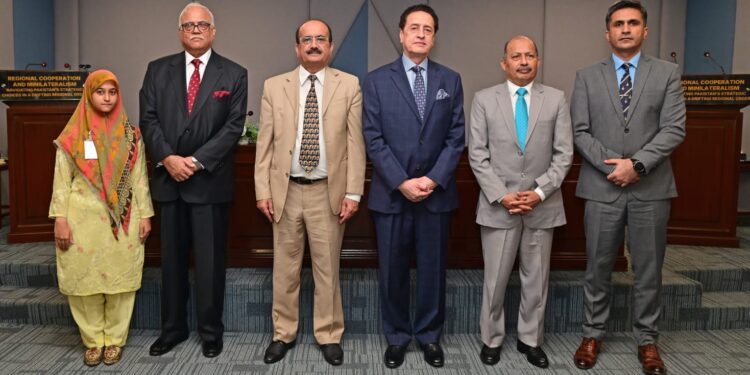Lahore
The Centre for Aerospace and Security Studies (CASS) Lahore organised a seminar titled, “Regional Cooperation and Minilateralism: Navigating Pakistan’s Strategic Choices in a Drifting Regional Order,” on 23 October 2025. The event was widely attended by academia, students, intellectuals, and domain experts. CASS is an independent think tank that continues to arrange academic events for scholars and practitioners interested in national security in its wider context. Ambassador Muhammad Haroon Shaukat (Retd), Director, CASS Lahore, made the opening remarks.
Senator Mushahid Hussain Sayed, speaking online, highlighted historic global shifts, declaring the West’s decline irreversible and China’s rise unstoppable. He emphasised Pakistan’s evolution into a ‘Muslim Middle Power’ and noted a new South Asia where nations like Bangladesh, Nepal, Sri Lanka, and Maldives are distancing from India, leaving it regionally isolated. He asserted China’s integration into South Asia and supported minilateralism for regional cooperation.
He praised the PAF’s prowess during May War and celebrated the Strategic Mutual Defence Agreement as proof of Pakistan’s role as a net security provider.
Ambassador Mansoor Ahmad Khan asserted that Pakistan was constrained by three overlapping realities: balancing relations with China and the US, India condominium, and its economic imperatives. Possibilities of minilateral arrangements could include a SAARC like arrangement with China, minus India, Pakistan-Afghanistan and the Central Asian Republics; and Pakistan Saudi Arabia, UAE, and Iran. He stated that Pakistan could become a connectivity hub between the Gulf region, Central Asia, and West Asia, through minilateral arrangements. However, Afghanistan’s insecurity was cited as a key hindrance.
Prof Dr Syed Tahir Hijazi delved in great detail about harnessing the economic potential of closer ties with key countries in the broader region, including Saudi Arabia, other GCC states, Turkey, Bangladesh, Iran, Azerbaijan, and Afghanistan. He identified sectors of cooperation with different groups of countries, which may include enhancing skills of a large workforce; food security ventures; digital transformation; minerals; energy; tourism, indigenous defence production, as well as the aerospace industry. He advocated greater government efficiency, simplification of regulations, and fostering business-friendly policies.
In his concluding remarks, Air Marshal Asim Suleiman (Retd), President, CASS, Lahore, stated that minilateralism allows like-minded states to pursue goals of peace and stability, especially in the backdrop of multilateral forums becoming politicised. Focusing on the example of Pakistan, he observed the country’s early embrace of minilateralism through the RCD, now ECO. He added that Pakistan should capitalise on its enhanced global standing following the Armed Forces’ victory against India in the May 2025 war, in which Pakistan Air Force performed in an outstanding manner under the leadership of Air Chief Marshal Zaheer Ahmed Baber Sidhu.
Building on this success, Pakistan should deepen ties with South Asian neighbours, Gulf partners, and Central Asian states to create a zone of cooperation grounded in the principles of minilateralism in an evolving regional landscape. The interactive session emphasised the usefulness of minilateralism, emerging challenges from Afghanistan, and Pakistan’s push for cooperative arrangements for regional stability in the post May 2025 environment.

























